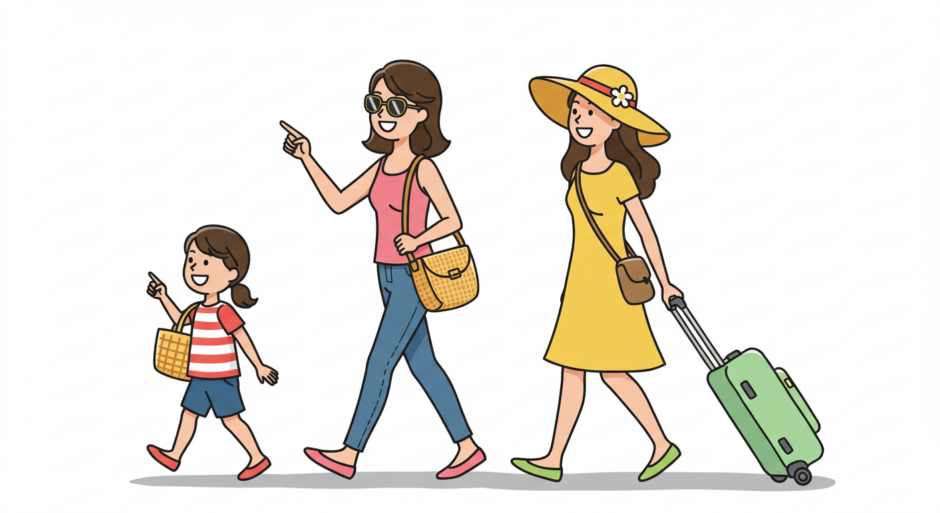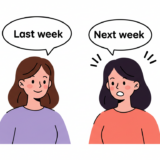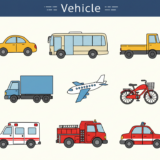Learn How to Describe People and Relationships in Japanese (Lesson 10)
日本語で誰かと一緒に行動を話す – 友達、家族など。「友達と」「家族と」など、「と」の助詞を使って一緒に行動する相手を表す日本語の文法を学びましょう。
✨ Why Learn Partner Expressions in Japanese?
Mastering expressions like “who,” “with,” and “together” helps you describe relationships and interactions smoothly. These simple words allow you to talk about who you are with, who you’re doing something with, and how you’re spending time together. Using these expressions correctly will improve your ability to share plans, experiences, and conversations, making your Japanese sound more natural and fluent.
🗝️ How to Say “With Someone” in Japanese Using “~と”
🔹Who did you go with to the movie theater?
誰と映画館に行きましたか。
だれと えいがかんに いきましたか。
🔹I went to the movie theater with Kim.
キムさんと行きました。
きむさんと いきました。
🔹I went to the movie theater together with Kim.
キムさんと一緒に行きました。
きむさんと いっしょに いきました。
🔹I went to the movie theater alone.
一人で行きました。
ひとりで いきました。
👥 Basic Vocabulary for Talking About People in Japanese
- family: 家族 (かぞく)|kazoku
- my father: 父 (ちち)|chichi
- my mother: 母 (はは)|haha
- my older brother: 兄 (あに)|ani
- my older sister: 姉 (あね)|ane
- my younger brother: 弟 (おとうと)|otouto
- my younger sister: 妹 (いもうと)|imouto
- relatives: 親戚 (しんせき)|shinseki
- friends: 友達 (ともだち)|tomodachi
- boyfriend: 彼氏 (かれし)|kareshi
- girlfriend: 彼女 (かのじょ)|kanojo
- male: 男性 (だんせい)|dansei
- female: 女性 (じょせい)|josei
- man: 男の人 (おとこのひと)|otoko no hito
- woman: 女の人 (おんなのひと)|onna no hito
- boy: 男の子 (おとこのこ)|otoko no ko
- girl: 女の子 (おんなのこ)|onna no ko
- alone: 一人で (ひとりで)|hitoride
- who: だれ (dare)
- with (person): ~と (~to)
- together: 一緒に (いっしょに)|isshoni
📝 Practice Questions
- 先週末、どこかに行きましたか。
せんしゅうまつ、どこかに いきましたか。
Did you go anywhere last weekend? - 誰と行きましたか。
だれと いきましたか。
Who did you go with? - そこによく行きますか。
そこに よく いきますか。
Do you often go there? - 昨日、どこかに行きましたか。
きのう、どこかに いきましたか。
Did you go anywhere yesterday? - 誰と行きましたか。
だれと いきましたか。
Who did you go with? - そこによく行きますか。
そこに よくいきますか。
Do you often go there? - よく海に行きますか。
よく うみに いきますか。
Do you often go to the ocean?
✅Practice using the vocabulary: Make simple sentences using the words you’ve learned. For example, try saying “I go with my friend” using the words for “friend” (ともだち) and “go” (いきます).
✅Use “いっしょに”: Remember that “いっしょに” (together) adds a friendly tone, so use it when you want to express doing something together, not just “with.”
✅Ask and answer questions: Try asking someone “だれと いきますか?” and answer with “きむさんと いきます” to practice your question and answer skills.
✅Take your time with kanji: While learning kanji, start with basic characters like “父” (father) and “母” (mother) to get familiar with their readings and meanings.
✨ Want to learn more vocabulary like this?
👉 Check our full beginner’s course on Smart Japanese Learning !
Boost Your Japanese Fluency with Personalized Lessons!
My name is Ellie<Eri えり>, and I’m a Japanese tutor on italki. If you’re looking to practice speaking Japanese and improve your fluency, I’d love to help! Feel free to schedule a lesson with me, and let’s start speaking Japanese together. Whether you’re a beginner or advanced, I’ll tailor the lesson to your needs. Looking forward to our conversation!




